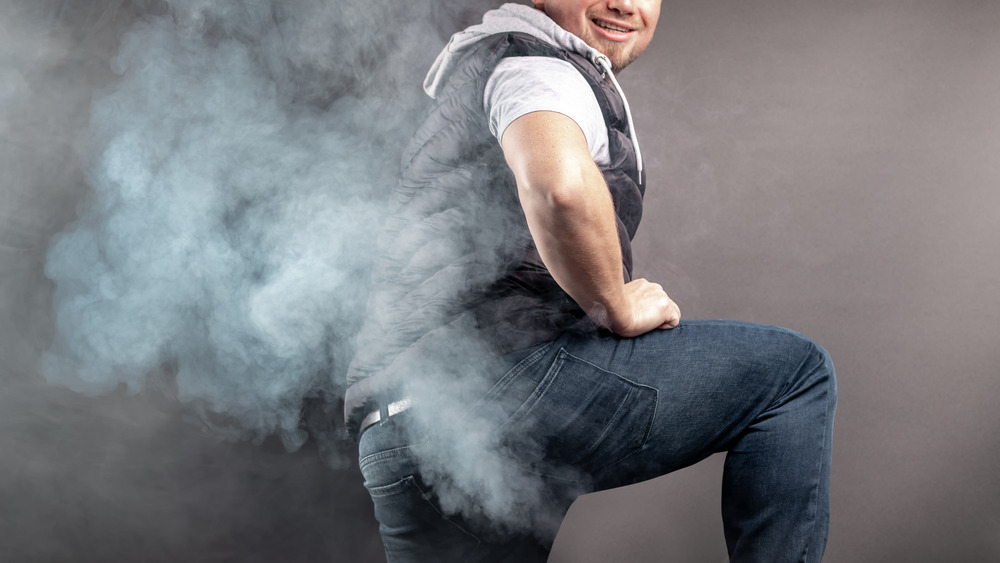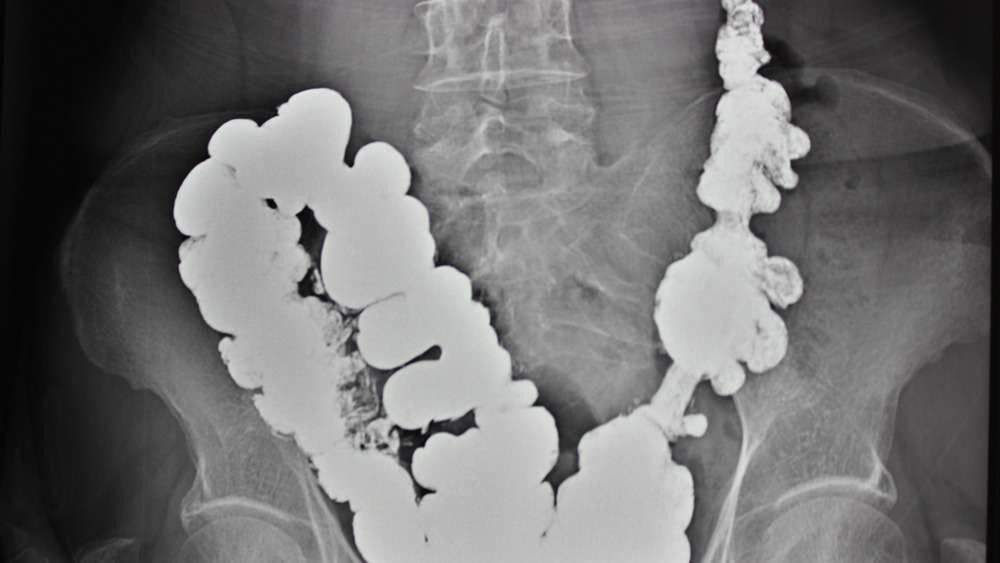When You Hold In Your Fart, Here's What Actually Happens To Your Body
Everybody likes a fart, but not everyone likes other people's farts. So, most of us try to be decent, respectful human beings the majority of the time we're interacting with the rest of society. (Okay — in front of strangers, at least.) We'll feel that telltale rumbling in our tummies telling us that fart is a-comin', and our butt cheeks clench with a force that could pop walnuts like water balloons. We lock it in, pray we have the fortitude to keep our smelly shame in our guts where we hope it will fizzle out and return to the void of which we do not speak. That's not always a reality.
As Healthline so openly admits, the average person cuts the proverbial cheese between five and 15 times each and every day. That's a whole lot of gas, friend. Gastroenterologist Dr. Svetang Desai from the Medical Center at Duke University says (via Everyday Health) those numbers come out to be somewhere in the ballpark of half to 1.5 L of intestinal gas each day if we're being frank. And where some of us are 20 oz. soda bottles and others are closer to two liters, there are an unlucky few who might be hauling around metaphorical pony kegs of compressed farts in their bellies. Everyone's anatomy is different, and we're not here to judge. Our job is to give you the facts. So, what actually happens to your body when you hold in a fart?
What actually is a fart?
Before we can know what held-in farts do to your insides, we have to really understand what a fart even is. It's science time. According to Medical News Daily, a fart — aka "flatulence," aka "the bowel blow," aka "the unholy bottom burp" — is a mix of gasses that get into our digestive tract through a number of different mechanisms which our body later forces out of our anuses. Some of that gas is simple atmospheric air we swallowed while eating, drinking, sucking on a straw, chewing gum, or smoking. Other gasses, such as the hydrogen sulfide gas that gives our flatulence its signature "crack a window" smell, come from the digestive process itself. Chemical interactions between food and digestive juices release gasses as a byproduct when our dinner is broken down into absorbable nutrients. Our gut bacteria plays a role too, adding their own little farts onto our bigger farts while they do their beneficial work breaking down excess starches.
Of course, that's just our normal farts. Some farts are the result of medical disorders and food intolerance, but even those things tend to produce farts of a similar design but in higher quantities and with differing gas ratios.
What happens when you hold it in?
Now that we know what our gasses are made of, we can clear the air about the whole "holding it in" subject. So we're clenched and fighting natural forces to keep the demon wind from escaping out exit shafts, but that gas still has to go somewhere. It makes its way back through the intestines to the home of its birth. Don't worry. It's not going to stay there. As Newsweek points out, that gas will likely find a way out of your body via one orifice or another, either working through the large and small intestines, up past the stomach, and out your mouth in the form of a slightly less-offensive burp, or the fart will overpower our final sphincters and bellow a brass-section laugh at the notion of "silent but deadly." Or, you know, we'll just fart it out in our sleep when we're relaxed. If you have a partner in your bed, they'll likely hear it, but being unconscious might save you some embarrassment.
While all of that's going on, Seeker (via YouTube) says the gas has been absorbing through the intestinal wall and into our bloodstream, causing belly pain, discomfort, and obnoxious bloating. That's what typically happens to your body when you hold in a fart, but preventing gas from escaping regularly or having certain medical conditions can turn a held-in fart into something much more dangerous.
Is it dangerous to hold that fart in?
First and probably the scariest of the "dangerous things that can happen when you hold in your farts" is anything but pretty. According to What If, inadvertent holding-in of farts from some sort of blockage can actually cause the gas to buildup and expand your intestines like an over-inflated balloon animal until – pop! – they burst. To be honest, this isn't something that's likely to happen to you. It's an extremely rare occurrence that usually only affects already ill patients.
What's more likely to happen is less extreme but still very much unwanted by even the most masochistic. Repeated holding-in of farts, as noted by The Conversation, can lead to a condition known as diverticulitis. This condition causes your gut to develop pouches that get swollen and inflamed and generally just muck up the digestive process. The symptoms can be fairly unpleasant. According to the Mayo Clinic, these can include anything from severe abdominal pain to vomiting, constipation or diarrhea, fever, and, of course, rectal bleeding. It can also lead to further complications in the case of infection. Basically, the best thing you can do for your colon is to just let 'er rip when the gas is begging for release. Probably not on the elevator, though.



